Stress, Anxiety and Depression Explained . . .
The following article is #1 in our 4-part series on Emotional Health
In todays world we are:
Depression and anxiety has turned into a worldwide pandemic.
And it’s largely to do with stress.
This is not a culture that views taking time out for ourselves to relax and recharge as commendable.
In fact it is seen as lazy . . .
And it’s taking its toll.
The pressure that is put on human beings at this time seems insurmountable.
Not only external pressures, but also INTERNAL pressures.
Pressure we put on ourselves.
The truth is that we cannot live up to any of these expectations, and the good news is . . .
WE DON'T HAVE TO.
It is not possible.
We CAN improve our Emotional Health.
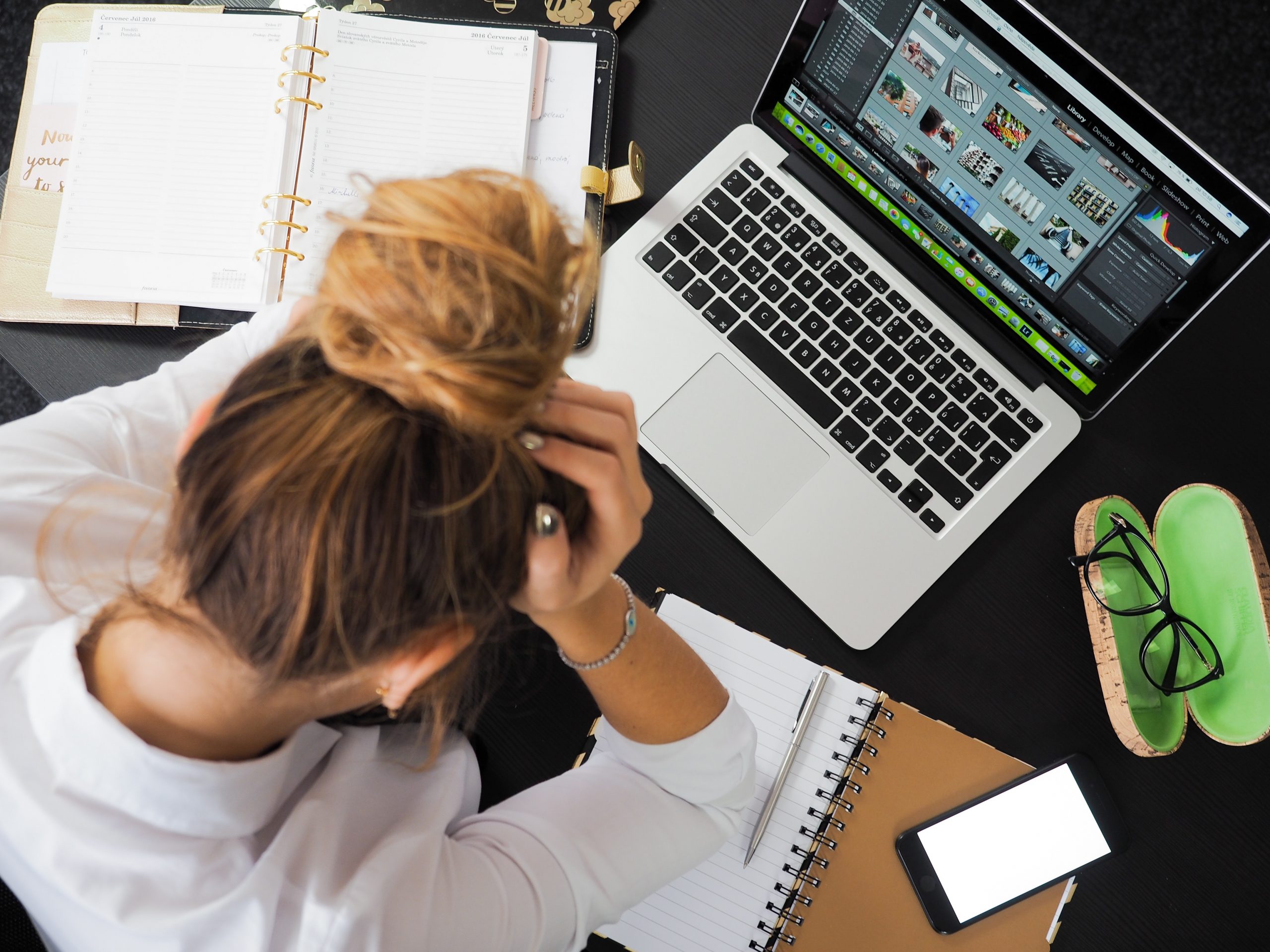
Our stress is our stress and is different with everyone because our perception of the world differs from one person to another.
These days our phones, laptops, tablets, televisions, radios, newspapers and even the people we meet are full of news and information that can often (actually, almost always) be conflicting. Not only with the current pandemic, but with just about topic of conversation.
We are pressured to work harder, train harder, love harder, be happier, make more money, travel more, buy the newest car, all while saving the environment, raising quiet, well-mannered, perfect children, being the perfect partner, cooking meals, maintaining a perfect house and tending to our gardens. If we express we need a break, we feel judged.
We are taken away from what our true, intrinsic belief systems are and bombarded with so much information and pressure, it’s impossible to know where to look or what to believe or feel. We are left asking questions like “Who am I, really?”, “What do I actually feel/believe?”, and feeling as though we are not living in our true authenticity.
Stress, depression and anxiety are only natural when our internal ecosystem is so out of balance. We are almost forced to live in the past or the future, which is where these states of depression and anxiety stem from.
“In today’s rush, we all think too much, seek too much, want too much and forget about the joy of just being.” Eckhart Tolle
In this 4 part series we will go through what Stress and Anxiety actually are, how they affect not only our mental wellbeing, but also our physical wellbeing, and then we will go on to give you lots of real tools, based on over 40,000 years of wisdom from ancient medicine, that will help you reclaim your mind, heal your body, stay in the present moment and feel free.
So. . . take a moment before we begin to. . .
Get comfortable.
Inhale.
Exhale.
Shift your consciousness to your heart centre.
Feel gentleness and compassion for yourself.
“Our own worst enemy cannot harm us as much as our unwise thoughts. No one can help us as much as our own compassionate thoughts.” - Buddha
Dive in.

Did you know . . .
An average person has about 12,000 to 60,000 thoughts per day. Of those, 80% are negative and 95% are repetitive thoughts.
Essentially, we are obsessed with negativity.
HOWEVER. . .
The mind that creates disharmony, disease and challenges, is also the same mind that creates harmony, wellness and freedom.
AND . . .
95% of your thoughts, are not your own.
They are picked up from elsewhere. . . especially prior to the age of 7 is where most of these thoughts or perceptions come from.
You are not your thoughts. . .
INTERESTINGLY . . .
Everything is impermanent.
By the time you finish reading this sentence your body will have regenerated over 20 million new cells. Approximately 330 billion cells are replenished every day, and in 80 to 100 days 30 trillion cells will have replenished - the equivalent of a new you.
“No man ever steps in the same river twice, for it's not the same river and he's not the same man”. - Heraclitus
PLUS
Trillions, not millions or billions, but trillions of genetic mutations are made everyday.
If negative stressful thoughts are present, the genetic expression will be negative to ones health. However, if positive thoughts are present your genes will be positively expressed creating great health and have the power to reverse any disease.
Mindfulness can set us free, for it is the observation of our thoughts without judgment.
“When we accept our life in the present moment we let go of resistance and only then can we begin the change. Change only comes after resistance.” — Dr Shefali Tsabary
According to the Morphic Resonance Theory, discovered by Dr Robert Sheldrake, a change in one person will go on to affect at least 150,000 other people.
“We don’t have to do all of it alone. We were never meant to.” ― Brené Brown
Let’s get right in to our psyche, unpack all the boxes and take out the proverbial rubbish, together.
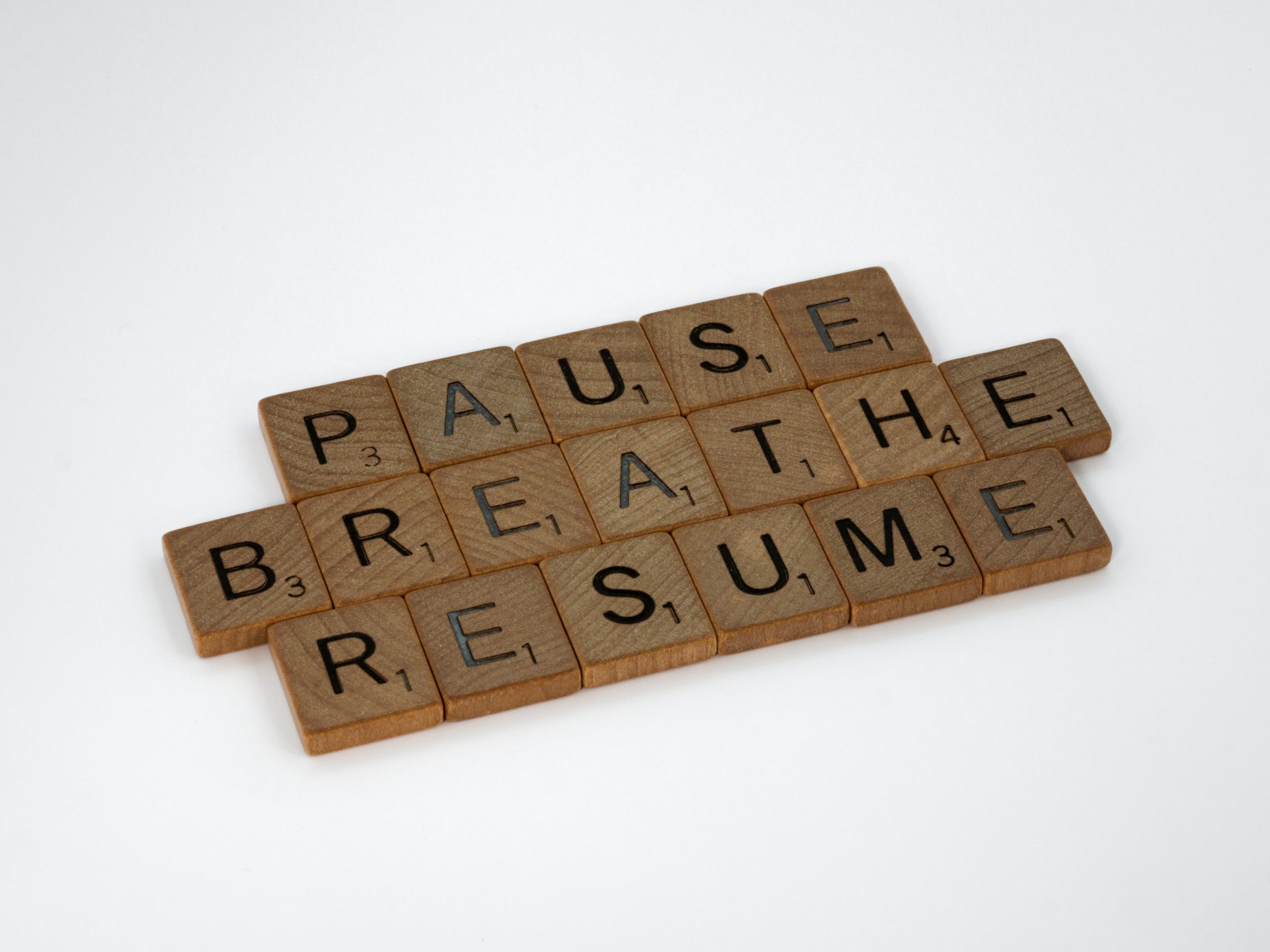
What is Stress?
“Everyone knows what stress is, but nobody really knows.” - Hans Selye.
Thanks Hans, super helpful there . . .
But he’s right . . .
Scientists have had a really hard time finding a suitable and precise definition of stress.
They have found it so challenging because of its subjectivity - one type of stressor can be perceived and felt so differently from one person to the next.
Some researchers have concluded that stress is a threatening situation, such as a high-stress job, a big change or overcrowding. This type of definition is known as stimulus-based, meaning that stress is a stimulus that causes certain reactions.
Others, such as our friend from before, endocrinologist Hans Selye, have a response-based definition of stress, meaning that the stress is a response to the environmental conditions.
Selye defines stress as “The response of the body to any demand, whether it is caused by, or results in, pleasant or unpleasant conditions” (Selye, 1976, p. 74).
Both of these definitions are problematic because they fail to take into the account the differences in psychological perceptions of the stimulus or environmental conditions. They are not complete definitions of stress.
Instead they only focus on the physiological reactions that occur. The psychological reaction that occurs however, can differ dramatically depending on the person.
For example, imagine two men in their twenties, both a renting a house and their lease has been ended abruptly due to their landlord selling the property.
One of the men, we will call him Billy, thinks ‘I have no where to go! The rental market is so crazy right now, I’ll never find a new place! What if I have to sleep in my car? What will my friends think?’.
On the other hand, the other man, Harry, thinks ‘Hmm, okay, this isn’t great, but I’ll find some where new soon enough and if I can’t, I can stay with my friends a while. There are lots of options, and new places to explore. This is an opportunity for change and growth’.
Although both Billy and Harry view the situation as a potential threat, the way they react and their thought patterns in finding potential solutions after the threat is identified, result in very differing levels of stress.
Ultimately, we have control over how stress affects our lives, and our response is largely dependent on the kinds of resources and lifestyle tools we have up our sleeves.
Or, in other words a threat tends to be viewed as less catastrophic if one believes something can be done about it. (Lazarus & Folkman, 1984)
If we do not have access to these tools ie. coping strategies, support or resources, we may face the negative consequences stress can have on our health. And there are many.
The Effect Stress Has On Our Health.
When we experience stress, the bodies general physiological reaction is to go into a fight-or-flight response. A number of physiological reactions occur to prepare the body for this response. These are outlined in the diagram below.
First, one or more of our senses send a message to the amygdala (a part of the brain that is responsible for emotional processing, and memories associated with fear).
If the amygdala perceives danger, it immediately sends a message to the hypothalamus which acts like the command centre of the brain, sending information and messages to our automatic nervous system.
This system controls all the involuntary bodily functions like breathing, blood pressure and our heartbeat.
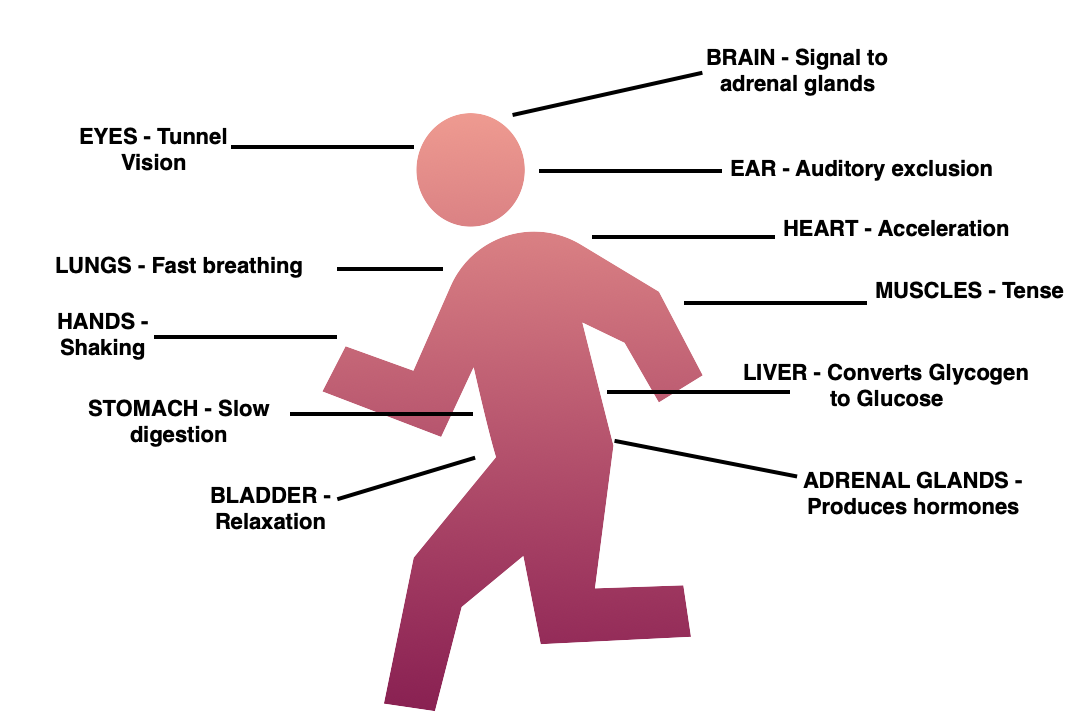
If this stress continues on for longer, the body will enter the exhaustion phase where it can no longer adapt to the stressor. It has depleted all of its resources for coping and it starts to take a toll on the body, causing organ and tissue damage, illness, disease and even death.
Understanding the the reason behind, and also the symptoms of this activation can help us to de-escalate situations that are not life threatening, but may seem so because of the changes we feel in our bodies.
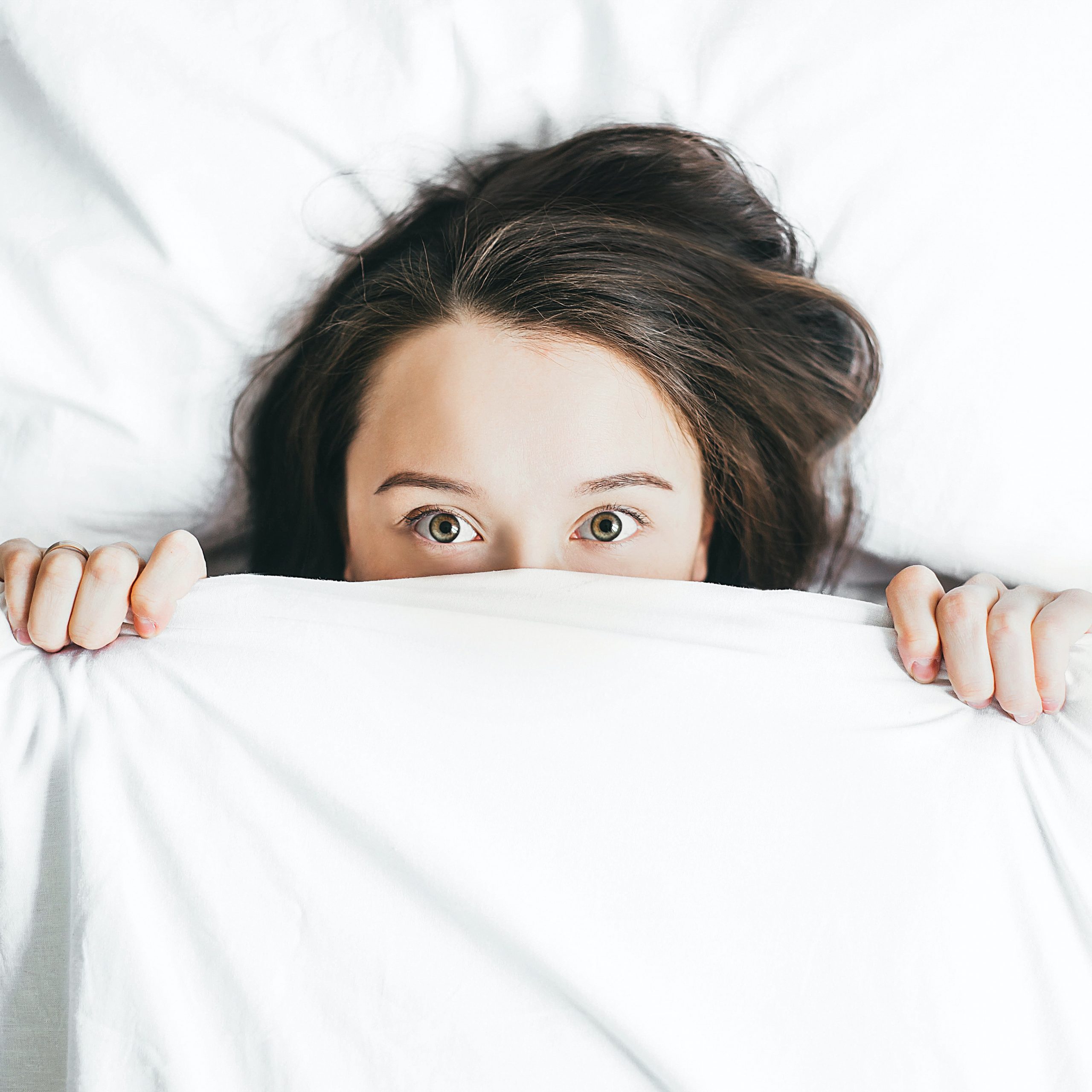
What is Anxiety?
Where stress is typically caused by an external trigger, anxiety is defined as persistent, external worries that do not go away, even in the absence of a stressor.
Anxiety is largely caused by worrying about the future.
It is a common problem with around 35% of the world’s population being affected by an anxiety disorder in their lifetime.
Recordings of anxiety have been noted in books such as ‘The Anatomy of Melancholy’, written in 1621 by author Robert Burton, who cited Hippocrates’ writing on one of his patients; “He dare not come into company for fear he should be misused, disgraced, overshoot himself in gestures or speeches, or be sick; he thinks every man observeth him.”
Anxiety is a natural human state and a vital part of our lives, keeping us safe from potential harm by activating the fight or flight system within our bodies.
Much like stress, persistent anxiety can lead to real psychological and physiological symptoms that can turn into disorders and make us extremely unwell.
Again it comes down to your resilience levels, and the tools you have in your box of coping strategies to keep anxiety from tipping over the edge and turning into a disorder.
Symptoms of Anxiety.

What is Depression?
Stress, anxiety and depression are often blanketed or presumed to be one in the same.
This is not the case.
People with depression can experience intense negative thoughts and feelings most of the time. It affects more than 264 million people worldwide.
When depressed one may experience sadness, lack of pleasure, irritation or negative thinking that can seriously affect a persons physical and mental wellbeing, as well as have an impact on relationships, work, education and the social aspects of life.
As mentioned before Anxiety is often linked to dwelling in the future.
In this instance, depression is linked to dwelling in the past.
Symptoms of Depression.

Before we wrap this article up, habits can be formed and broken and both anxiety and depression can be habitual forms of thinking.
We get into the habit of thinking negatively about ourselves or the world around us, or we habitually delve into the the future, worrying about what will happen next. Things out of our control.
To break these habits, we can teach our mind to stay in the present by practicing mindfulness.
Practicing mindfulness helps us to recognise and accept that these thought patterns are occurring and respond to these patterns differently through observation, compassion and equanimity.
What is Mindfulness?
Mindfulness is essentially a meditation, where we observe our thoughts, feelings, bodily sensations and surroundings inside each moment.
This is done through the eyes of a compassionate observer, without judgement or feelings of shame or guilt. When the mind wanders, we note where it has wandered and calmly bring our awareness back to the ‘now’ or the present moment.
By doing this we can consciously heal many of our internal wounds, fears and traumas.
Each time we observe, accept and return to now we are letting go of these emotions. We begin to forgive ourselves, and forgive those who may have hurt us, lifting or stripping away the heavy layers that keep us from realising our true potential, and transforming our suffering into understanding and compassion.
Mindfulness is a powerful healing technique.
How?
The mind can be brought back to the present moment by focusing on our breathing or sensations felt throughout our body.
Examples of some of these sensations may be where we feel cool or warm, a breeze or sunlight on your skin, taking note of the ground beneath your feet as you walk, using all of the senses when we eat, or how the breath feels as it touches the upper lip as we exhale through our nose.
We can also use a simple yoga move or body movements that will help bring you back to now.
“The primary cause of unhappiness is never the situation but your thoughts about it. Be aware of the thoughts you are thinking. Separate them from the situation, which is always neutral, which always is as it is.” ― Eckhart Tolle
By practicing mindfulness regularly, we can change our thought patterns and re-establish our connection with the present, and ultimately the connection with ourselves.
Remind yourself that the ‘now’ is the only true reality.
Freeing ourselves from the past and the future can help us consciously shift emotional and psychological blockages that may be preventing us from reaching the goals we have set for ourselves.
I hope this has been helpful in understanding Stress, Anxiety and Depression.
The more our thoughts both consciously and sub-consciously are positive, the trillions of genetic expressions that occur daily will be positive towards our health.
In the next article we will take a look at the root cause of mental health disorders, as well as how our subconscious belief systems affect our susceptibility and resilience to emotional turmoil and how these can be formed.
Until next time,
Dedicated to Improving Your Wellbeing and Committed To Helping You Achieve Abundant Health and Wealth,
The team at Unique Health and Wellness.
P.S. If you or someone you know are experiencing depression, anxiety, or feelings of hopelessness please give the clinic a ring now so that we can chat about the ways we can help.
If it’s suicidal thoughts, please know that you and/or your loved one are not alone. We are always here if you feel you need to talk, and alternatively speaking to your regular Doctor as soon as possible or calling Beyond Blue on 1300 22 4636 can also help.
Would You Like To Find Out More?
For members of the clinic please send us an email with "EMOTIONAL HEALTH" in the headline
and we will get back to you.
Or . . .
For those who are not members of the clinic, there are two ways you can respond. . .
1. I would like to book in for your Free 20 Minute consultation online to ask further questions on how you can help me . . . or I will phone you on 07 5474 5354
2. I am pro-active about my health. I want to book now and I realise the consultation is normally valued at $300.00, however if I act now I will receive a substantial discount!
?? HAVE QUESTIONS ??
Please Click the Image Below to Send Us and Email
All communications, answers, comments, and opinions provided on www.uniquehealthandwellness.com.au are only general information and are not intended to be a substitute for informed professional medical, psychiatric, psychological, investment, legal, or other professional advice. You should always speak with your doctor, general practitioner, physician, or other healthcare professional before taking any medication or nutritional, herbal, or homeopathic supplement, or adopting any natural treatment for a health problem.
If you have or suspect that you have a medical problem, promptly contact your health care provider. You should always speak with your investment advisor, accountant, before taking any investment advice. Information provided on www.uniquehealthandwellness.com.au and the use of any products or services advertised on www.uniquehealthandwellness.com.au by you DOES NOT create a doctor-patient or client-investor relationship between you and any of the advisors or other’s affiliated with www.uniquehealthandwellness.com.au.
Any information on www.uniquehealthandwellness.com.au are NOT intended to diagnose, cure, or prevent any disease or illness. Or give any investment advice. If you do anything recommended on Unique Health and Wellness website, without the supervision of a licensed medical doctor or health practitioner or psychiatrist or psychologist or investment advisor, or from a professional within that field you do so at your own risk and Unique Health and Wellness shall not accept any liability if this has not been done.
TAKE NOTICE THAT -
By entering or registering on the website or clicking agree or accept on the website it shall be taken that you hereby agree to the terms of this COMMON LAW
TAKE NOTICE THAT -
Unique Health and Wellness takes no responsibility for any unsafe practice.
TAKE NOTICE THAT -
Any email, article, blog post, content and document within www.uniquehealthandwellness.com.au or other content or documents that may be added in the future are not to be shared, emailed, photographed, copied with any other person, natural person, corporation or entity now or in the future.
TAKE NOTICE THAT -
Any duplicating of any information mentioned above shall entitle Unique Health and Wellness PTY LTD to investigate further legal remedy, at your cost and at no further notice to you and you shall have no legal claim in this matter.
TAKE NOTICE THAT -
By reading this, you also agree to all of the following: You understand this to be an expression of opinions and not professional advice. You are solely responsible for how you use any content and hold Unique Health and Wellness PTY LTD and all members and affiliates harmless in any event or claim.
TAKE NOTICE THAT -
If you purchase anything through a link in this email, you should assume that we have an affiliate relationship with the company providing the product or service that you purchase, and that we will be paid in some way. We recommend that you do your own independent research before purchasing anything.
Copyright © 2022 Unique Health and Wellness PTY LTD. All Rights Reserved.
To make sure you keep getting these emails, please ad us to your address book or whitelist us. If you don't want to receive any other emails, click on the unsubscribe link below.

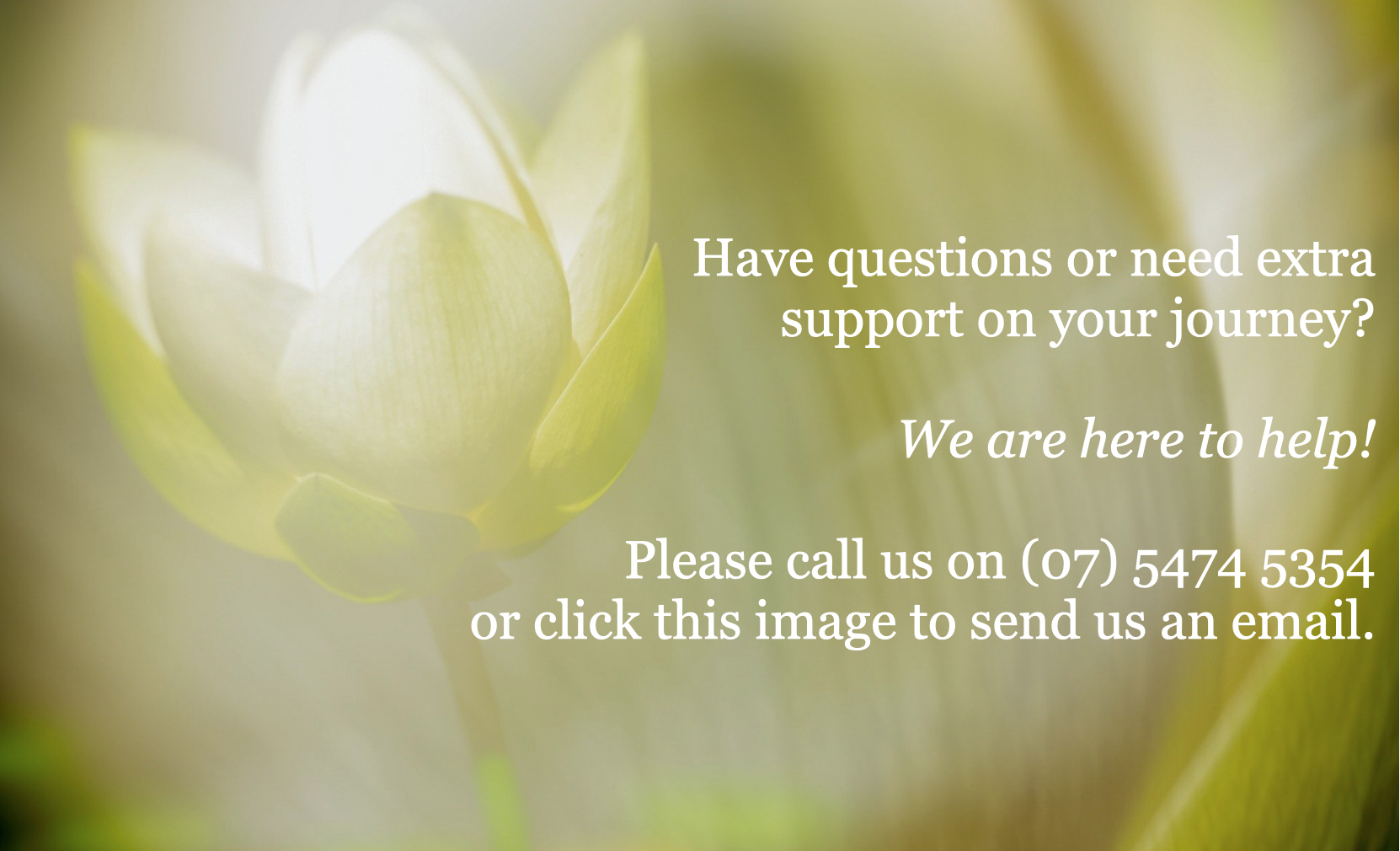
MORE BLOG STORIES
Breaking Down the B Vitamins
Amazing Ways to Help Heal Mitochondrial Dysfunction!
The 5 Worst Foods For Your Gut
‘THE GOLDEN GODDESS’
Mitochondria, Inflammation and Oxidative Stress
Tired? You May Be Suffering From Mitochondrial Dysfunction